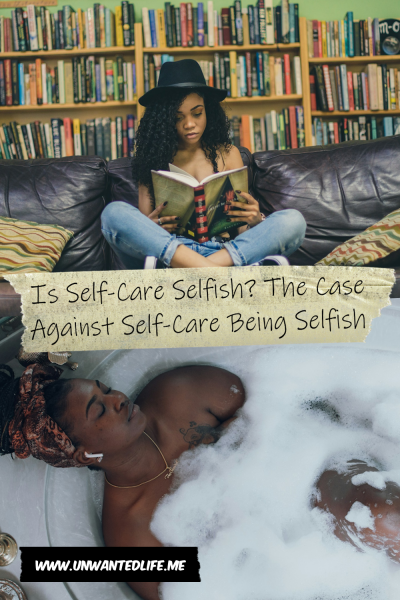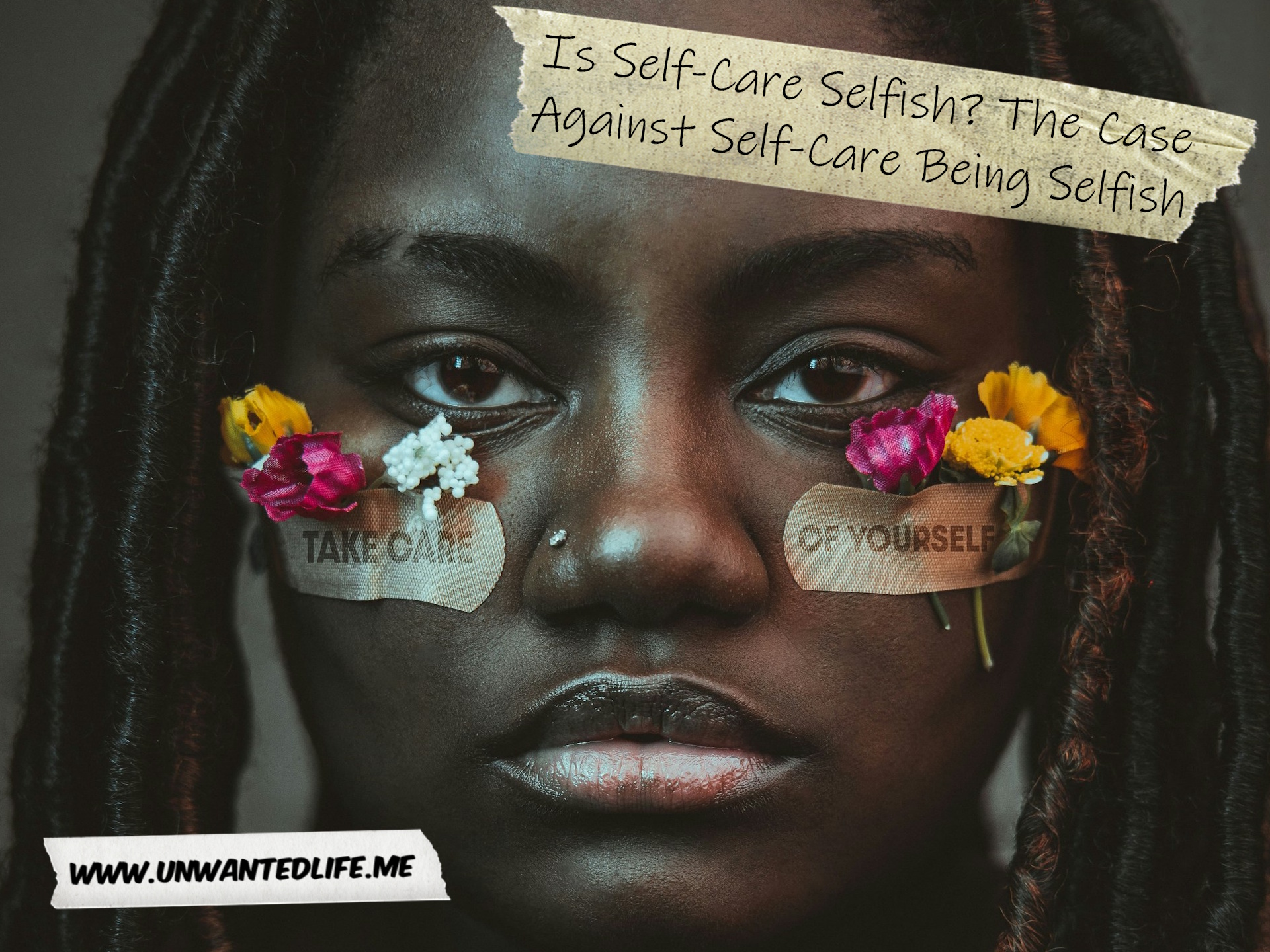Self-care seems to have an odd place in society. It’s both seen as important thanks to the progress of campaigns to help us acknowledge the importance of good mental health, but also as a dirty word. So I’m here to challenge the idea that it’s somehow wrong to look after our wellbeing, that it’s not selfish to do so. I hope this article changes your mind on whether this is selfish.
What Is Self-Care
Although some people mistakenly describe self-care as some form of indulgence, the reality is that it’s a commitment to work on our mental, physical, emotional, and spiritual health (Scharff, 2021). Sometimes that might mean being indulgent, but that’s ok. What’s life without a little indulgence?
Self-Care: What Does It Mean To Be Selfish?
When we’re selfish, that means we have a lack of consideration for others or take from others for our own gain (Scharff, 2021). Being selfish is only caring about ourselves, our needs, our wants, and no one else’s.
Thus, what makes someone selfish is having no regard for how our actions impact others, no empathy for the suffering of others, showing no remorse if we’ve wronged someone, or using others (Marais, 2023). You get the idea.
Is Self-Care Selfish?
The idea that self-care is selfish is a misconception that often stems from societal expectations, particularly for women, to prioritise the needs of others. However, neglecting one’s own wellbeing can have detrimental effects on both personal and interpersonal relationships.
Thus, self-care is not selfish; selfishness involves disregarding others for personal gain, while self-care is about restoring our own wellbeing to better serve ourselves and others. By prioritising our needs through such acts to nourish ourselves, we replenish our energy, build resilience, and gain the capacity to contribute more effectively to our relationships and responsibilities.
According to Egunjobi (2024). If we look at self in its hierarchy of expression, we have selfish, self-care, and selfless. The three together deal with our approach to our and others’ needs. Children start in a selfish state, as they’re born helpless, and this is the only way for them to survive. But as we grow up, we learn how not to be selfish, at least for the majority of us.
A higher level of self is self-care. This is where we nurture our mental, physical, emotional, and spiritual health, which is an ongoing lifelong process. Doing this allows us to better manage the stresses of life as well as help others. At this stage, we focus on ourselves, but also on others. But the key here is not to lose the sense of self.
Therefore, if we’re already thinking that engaging in self-care is somehow selfish, then we aren’t selfish people. A selfish person wouldn’t care about whether they were being selfish or not in the first place.
Nevertheless, many of us still struggle with the guilt of looking after our wellbeing by doing even the most limited and basic activities that support our wellbeing. For some, to put others first is seen as the only way to be seen as a good person. That, for some reason (maldadtive core belief), means that looking after our own wellbeing equals neglecting others (Morse, 2025). But self-care is necessary. It’s the same reason we walk our dogs so they’re happy and healthy.
In my work as a therapist, many of my clients can’t seem to get past the belief that self-care is somehow selfish. The consequences of that are that they’re very stressed, overwhelmed, and ready to crack (Dempsey, 2022).
For a lot of us, it’s far easier to look after the wellbeing of others than it is to look after our own (Jami, 2021). As a former people-pleaser, I put my friends before everything, no matter the cost to me, and it wasn’t healthy. I eventually saw everyone as a user and did things I otherwise wouldn’t have done.
Because of these attitudes and beliefs, self-care comes with a big ol dollop of guilt. We see something that isn’t selfish as being selfish, because for some reason, putting our needs first and on an equal footing with others is unimaginable (Morse, 2025).
When I mention self-care to my clients, it’s like I’ve uttered a taboo. This is especially true for women, where there’s a greater societal expectation for women to sacrifice their own needs for others. This is one of the reasons mum guilt is so powerful.
As Barnett and Homany (2022) stated, self-care is the furthest thing from being selfish, and it shouldn’t be seen as an undesirable activity. It is essential to our wellbeing, but also the wellbeing of others. As we look after ourselves, we can also help support others, but it also means there’s less support needed from others as well. By that, I don’t mean we’d be a burden otherwise, but if everyone took the time to look after their wellbeing, there would just be a naturally occurring lack of need for as much support.
A study by Corral-Verdugo, Pato, and Torres-Soto (2021) with a sample of 290 participants looked at sustainable behaviours. The results show that sustainable behaviour was a chain of the individual, society, and nature, which begins with self-care that continues with caring for others, and caring for nature. In short, if we’re not looking after our own needs, it’s hard to look after other people, and even harder to care about our environment.
Helping and caring for others and our environment starts with caring for ourselves; otherwise, we burn out, and no caring is done.
Embracing Self-Care
It’s better to see self-care as a form of preventative activity, so using preventative language when talking about it can be a useful way to discuss and promote it (McFayden, 2025). It’s not something we should only do after we encounter difficulties, but as a way to avoid those difficulties or at least stop them from becoming too much to handle. Self-care is key to our resilience.
Burnout
If we don’t want to burn out, where engaging in our responsibilities becomes impossible, then we need self-care. This is simple burnout prevention. Success and sacrifice aren’t synonymous. By looking after ourselves, we allow ourselves to recharge, which in turn makes us more effective in every role we play (Morse, 2025).
Oxygen mask
One of the things we get told as part of the safety information given on flights is the importance of putting our own oxygen masks on before helping someone else during an emergency. By having that oxygen, we’re better able to help others with their masks (Dempsey, 2022). The same is true with self-care and our wellbeing.
Relationships
Making time for our self-care is also good for our relationships, because if we’re constantly putting other people’s needs first and ours are getting ignored as a result, then resentment can build within such relationships (Morse, 2025). When you prioritise our wellbeing, we become better equipped to be present, empathetic, and supportive in our relationships.
Increased productivity
This might not sound like it would be true, but it is. Taking breaks, practising mindfulness, and engaging in hobbies can boost productivity and creativity. Our energy, problem-solving, and creativity levels can be depleted, and taking breaks and engaging in the stuff we enjoy is how we top those up.
Furthermore, taking a break doesn’t mean we’re giving up on anything. Our subconscious will keep working on a problem even when our conscious mind isn’t. When a solution comes to us like this, it’s called a positive intrusive thought.

Perfectionism
Part of the reason we may have a negative view of self-care is because of the guilt our internal beliefs cause us. Perfectionism is one of the areas that makes looking after ourselves feel like we’re a failure or that we’re weak. For some reason, resilience is meant to mean never needing to look after our needs, when resilience is really about the importance of looking after our needs.
It’s impossible to stay 100% productive, and even if we could, life is about more than just being productive. Self-care isn’t something we need to earn (Morse, 2025); we already deserve to engage in it regularly.
Balance
If we’re really struggling with accepting that self-care is for all of us, and that it’s not selfish, then prioritise what truly are essential duties, objectively so, and work on looking after ourselves around those crucial priorities.
Reframe
As I’ve already said, self-care is a part of our resilience, and it helps to see it as a preventative strategy. So remind ourselves that it isn’t some sort of luxury (Morse, 2025), even when we’re indulging ourselves, but rather an investment in our wellbeing, our resilience, and others.
Saying “no”
“No” isn’t a dirty word; it’s a life skill. Boundaries like being able to say “no” are the difference between being overwhelmed and being our most productive, with the bonus of looking after our wellbeing.
Start small
To ease ourselves into accepting the importance and value of self-care and our own needs and wellbeing, start small. It can be a 10-minute walk, five pages of a book, or any microjoy we can think of.
Summary
The bottom line is that self-care is not selfish. Rather, it’s essential for our overall wellbeing. By practising it, we’re investing in ourselves, which ultimately benefits those around us. The key is to find a balance between looking after our wellbeing and fulfilling our responsibilities. It’s also important to remember that we all need to engage in it, and we all have a right to do so.
As always, leave your feedback in the comments section below. Also, please share your experiences with self-care guilt in the comments section below as well. Don’t forget, if you want to stay up-to-date with my blog, you can sign up for my newsletter below. Alternatively, click the red bell icon in the bottom right corner to get push notifications for new articles.
Lastly, if you’d like to support my blog, please find the PayPal and Ko-fi donation payment options below. Until next time, Unwanted Life readers.
References
Barnett, J. E., & Homany, G. (2022). The new self-care: It’s not all about you. Practice Innovations, 7(4), 313. Retrieved from https://www.apa.org/pubs/journals/releases/pri-pri0000190.pdf.
Corral-Verdugo, V., Pato, C., & Torres-Soto, N. (2021). Testing a tridimensional model of sustainable behavior: self-care, caring for others, and caring for the planet. Environment, Development and Sustainability, 23(9), 12867-12882. Retrieved from https://www.researchgate.net/profile/Nissa-Yaing/publication/350189149_Testing_a_tridimensional_model_of_sustainable_behavior_self-care_caring_for_others_and_caring_for_the_planet/links/6054f893299bf1736755143e/Testing-a-tridimensional-model-of-sustainable-behavior-self-care-caring-for-others-and-caring-for-the-planet.pdf.
Dempsey, K. (2022, September). How to Prioritise Self-Care Without Feeling Selfish. The Awareness Centre. Retrieved from https://theawarenesscentre.com/how-to-prioritise-self-care-without-feeling-selfish.
Egunjobi, J. (2024). The Hierarchy of Self: Selfish, Selfcare, Selfless. Lulu Press Inc. Retrieved from https://www.researchgate.net/profile/Joyzy-Pius-Egunjobi/publication/381316416_The_Hierarchy_of_Self_Selfish_Selfcare_Selfless/links/6668919aa54c5f0b945fbaaf/The-Hierarchy-of-Self-Selfish-Selfcare-Selfless.pdf.
Jami. (2021, February). Reframing ‘selfish’ to ‘self-care’. Jami. Retrieved from https://jamiuk.org/self-care-and-mental-health-2.
Marais, S. D. (2023, February). 5 Ways to assess and react to selfish people. Psych Central. Retrieved from https://psychcentral.com/health/reacting-to-selfish-people.
McFayden, T. (2025, February). Selflessly Selfish: Barriers and Recommendations for Self-Care. PCSAS. Retrieved from https://pcsas.org/newsletter/selflessly-selfish-barriers-and-recommendations-for-self-care.
Morse, T. (2025, February). The Hidden Guilt of Self-Care: Why It’s Okay to Put Yourself First. 3Rivers Therapists. Retrieved from https://www.3riverstherapists.com/new-blog/self-care-without-guilt.
Scharff, C. (2021, March). Seven ways to take care of yourself so you can be of service to others. Psychology Today. Retrieved from https://www.psychologytoday.com/gb/blog/ending-addiction-for-good/202103/is-self-care-selfish.


Self-care is anything but selfish — it’s about nourishing yourself so you can show up stronger and better for others 🙌🏾
Exactly. Thanks for commenting
Self-care is never selfish. Plus, it’s never about ego satisfaction. There’s a purpose of self-care. It’s to make us realise that we are loved, whole, and enough from the core.
Indeed. Self-care is very important for all of us. Thanks for commenting
I have to do self-care to help me take care of my PMDD and others I love when I feel better. So self-care is not selfish.